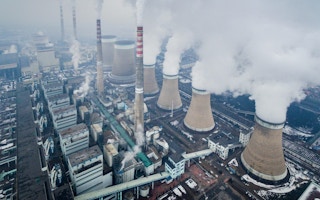The industry lobby group for the coal sector has said that the energy crisis is a “reality check” and that the world still needs coal. It contends that it is time to rethink the energy transition and consider all technologies that lower carbon emissions in the fight against climate change, including “clean coal”.
To continue reading, subscribe to Eco‑Business.
There's something for everyone. We offer a range of subscription plans.
- Access our stories and receive our Insights Weekly newsletter with the free EB Member plan.
- Unlock unlimited access to our content and archive with EB Circle.
- Publish your content with EB Premium.
Speaking at a commodities event in Switzerland last week, Michelle Manook, chief executive of London-headquartered World Coal Association (WCA), said that the energy crisis induced by the Covid-19 pandemic, which choked supply chains, showed that the transition to clean sources of power is complex, and requires “inclusivity of all fuels and technologies.”
Manook added that the COP26 climate talks in November, when China and India lobbied against a global agreement to completely phase-out coal, prompting a compromised “phase-down” of the fossil fuel, also showed that coal still has a role to play in the global energy mix.
“COP26 reinforced that coal, and more specifically abated coal through the deployment of clean coal technologies, will need to be part of any energy transformation,” she said.
WCA has been pushing for industry, governments and investors to advance clean coal technologies, which reduce the emissions from burning the fuel, and also carbon capture, use and storage (CCUS) technologies, which absorb and lock-in carbon before it is released into the atmosphere.
“
Coal-fired power cannot be considered to be either financially or environmentally sustainable. ‘Clean coal’ is a myth. Carbon capture and storage technology keeps on being promised, but continues to fail to emerge.
Simon Nicholas, energy finance analyst, Institute for Energy Economics and Financial Analysis
“Now, more than ever, we are called on to be balanced, realistic, and holistic in our energy future, considering the energy trilemma – in particular, the need for energy security and the importance of energy affordability.”
She also noted that Asian countries are “acutely aware” of the need to balance sustainability with affordability and security to establish “resilient future energy systems.”
“The developing and emerging nations including Asia acknowledge that the energy decarbonisation transition will take time,” said Manook. “Moreover, that innovation and technology will be critical to resolving economic, social, and environmental costs. Those technology choices will be different for nations.”
“Asia’s development and decarbonisation goals are not mutually exclusive. It is a reality they contend with every day,” she said.
Asia accounts for almost 80 per cent of the world’s coal consumption and is projected to drive coal demand globally over the next three decades, despite decarbonisation targets set by key economies including China, Japan, and South Korea.
Coal-dependent emerging economies such as Indonesia, the world’s largest exporter of the fossil fuel, Vietnam and Thailand, will account for more than two-thirds of the increase in global coal-fired generation from 2030 to 2050.
Asia is also highly vulnerable to climate change, which is exacerbated by burning coal. Manook’s comments come as atmospheric carbon dioxide have reached historic levels, driven largely by economic growth in China that was fuelled by coal-fired energy consumption.
Clean coal a “myth”
Analysts disagree with WCA’s claims that relying on coal-fired power is a positive for energy security, affordability and sustainability.
“Coal-fired power cannot be considered to be either financially or environmentally sustainable. So-called ‘clean coal’ is a myth - carbon capture and storage technology keeps on being promised, but continues to fail to emerge,” said Simon Nicholas, an energy finance analyst with think tank, Institute for Energy Economics and Financial Analysis (IEEFA).
Australia’s only working CCUS project in Western Australia failed to meets its target last year. Chevron, an America-based multinational oil and gas major, was given a target by the WA government to capture at least 80 per cent of the CO2 that would otherwise be released at its Gorgon LNG project. The shortfall was buffered with US$40 million investment in carbon credits in unspecified low carbon energy projects in the state.
The Russian invasion of Ukraine is evidence of the energy security risk of a reliance on imported fossil fuels, Nicholas added.
“Russia is the third-largest thermal coal exporter in the world. We have seen thermal coal prices spike to US$400 per tonne recently — which is clearly a bad outcome for affordability,” he said. The price has leapt from US$175.25 a tonne at the end of 2021, according to commodity price reporting firm, Argus.
Even before the invasion, coal-fired power plants were a major contributing factor to the growing financial crisis within Pakistan’s power system, he added. “This has inevitably led to significant electricity tariff increases - clearly a bad affordability outcome.”
Nicholas pointed to Bangladesh, where the first coal power plant to be fuelled by imported coal is “contributing to an increasingly unsustainable financial situation within its power system, which brings with it the threat of electricity tariff increases.”
Bangladesh recently cancelled 10 coal-fired power projects due to rising costs and calls from activists to pivot to clean energy.
However, he said that established coal markets in Asia such as China and India will continue to rely on coal-fired power, fuelled by their very large domestic mining output.
“Both countries are seeking to increase domestic coal supply, which will increasingly replace expensive coal imports. The recent high prices are likely to only accelerate this process and destroy long-term demand in emerging coal markets.”
The International Energy Agency warned in May last year that no new coal-fired power stations can be built if the world is to stay within safe limits of global heating, and meet the goal of net zero emissions by 2050.

















